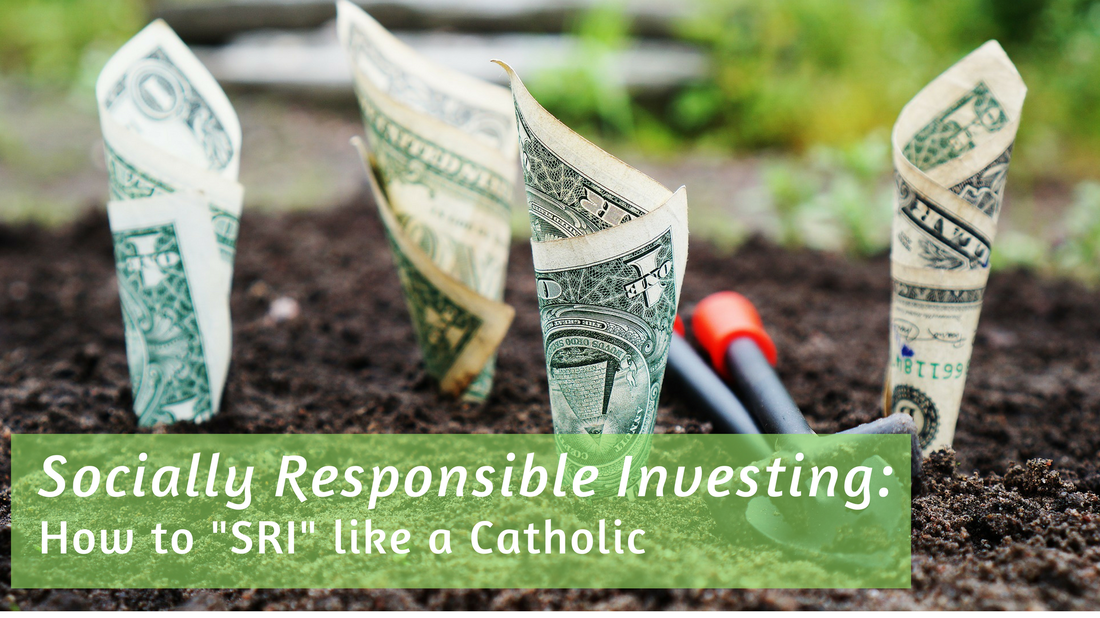|
“The intellectual nature of the human person is perfected by wisdom and needs to be, for wisdom gently attracts the mind of man to a quest and a love for what is true and good. Steeped in wisdom. man passes through visible realities to those which are unseen. Our era needs such wisdom more than bygone ages if the discoveries made by man are to be further humanized. For the future of the world stands in peril unless wiser men are forthcoming. It should also be pointed out that many nations, poorer in economic goods, are quite rich in wisdom and can offer noteworthy advantages to others.”
Gaudium Et Spes, Paragraph 15 A major trend in today’s economics is the importance of Socially Responsible Investing. The blending of entrepreneurial spirit with care for the common good is making waves across many aspects of culture in the United States. Socially Responsible Investing, or SRI as abbreviated here on, is being spoken of and acted upon more every day. But what is the phenomena, and why is it gaining popularity? My brief opinion will touch two key points, and then outline how these desires can be guided with the investing principles of the Catholic Church and direction from the United States Conference of Catholic Bishops (USCCB). 1. A growing awareness of need in the world. With the mediums of instant information, we now have access to knowledge of endless opportunities for charity. Every swipe of the thumb presents a new situation that needs attention. A country is being exploited and its citizens need refuge, a town is hit with a large senseless act of violence and needs support, families in other parts of the world need supplies to have sufficient shelter. The list could go on, but the point being is if you have trouble finding an opportunity to serve or give . . . you must be living under a rock. 2. The desire to make an impact on the world. Gen X, Y, and millennials have been raised on the encouragement “You can be whatever you want to be.” and as more and more people enter the workforce, more and more are becoming restless. Several major articles highlight that the movement within millennials is that they work for purpose VS working simply for a paycheck. This is easily noticed with the norm of changing college majors frequently, young people choosing career fields that do not pay high-median salaries, and even choosing a career later in life in order to feel some fulfillment in their choice. Hedonism is falling as young people see its vanity. Affirming other persons and their dignity is slowly taking the reigns of how young people live their lives. “In the economic and social realms, too, the dignity and complete vocation of the human person and the welfare of society as a whole are to be respected and promoted. For man is the source, the center, and the purpose of all economic and social life.” Gaudium Et Spes, Chapter III Economic and Social Life, Paragraph 63 Pope Paul VI summed up this innate desire with these words: “This likeness reveals that man, who is the only creature on earth which God willed for itself, cannot fully find himself except through a sincere gift of himself.” Gaudium Et Spes, Paragraph 24. With the economic system being so contiguous, the movement of SRI has become easily accessible. Movements such as Fair Trade, Micro Finance, and Sustainable Investing all have the goal of positive societal impact. Several cultural factors influence how people use their financial resources and are the key driver in SRI. This can be motivated by a person not supporting large corporations which could lead them to spend their money in local stores. A company can take a political stance on an issue and consumers will choose to either support them or not by their shopping habits. Many new businesses will have a sponsor charity that they donate a portion of profits, or the culture/model of profit sharing with employees or key clients. “A similar lack of economic and social balance is to be noticed between agriculture, industry, and the services, and also between different parts of one and the same country. The contrast between the economically more advanced countries and other countries is becoming more serious day by day, and the very peace of the world can be jeopardized thereby.” Gaudium Et Spes, Paragraph 63 The USCCB lays out 6 points of focus to consider when investing in companies and incorporating SRI. Each point is supported with points from encyclicals, historic teaching, observed historical impacts, as well as other supporting rhetoric.
Now each of these points can be broken down into sub-categorical conversations. Later articles will address each point in detail. Even if you are not a practicing Catholic, the aim of these six points is the good of all human persons and can easily be adopted into your desire for SRI. Whether through fair trade, profit sharing companies, or any other notable SRI initiative, the guidelines of the USCCB are a great framework to guide your conscience when considering how to spend or invest your financial resources. Please share and comment below! What are your questions on this topic? Additional Sources: Gaudium Et Spes http://www.vatican.va/archive/hist_councils/ii_vatican_council/documents/vat-ii_const_19651207_gaudium-et-spes_en.html USCCB Guidelines for Socially Responsible Investments http://www.usccb.org/about/financial-reporting/socially-responsible-investment-guidelines.cfm 3 things millennials want in a career (hint: it’s not more money) http://fortune.com/2015/03/26/3-things-millennials-want-in-a-career-hint-its-not-more-money/
3 Comments
|
AuthorWrite something about yourself. No need to be fancy, just an overview. Archives
October 2019
Categories
All
|


 RSS Feed
RSS Feed